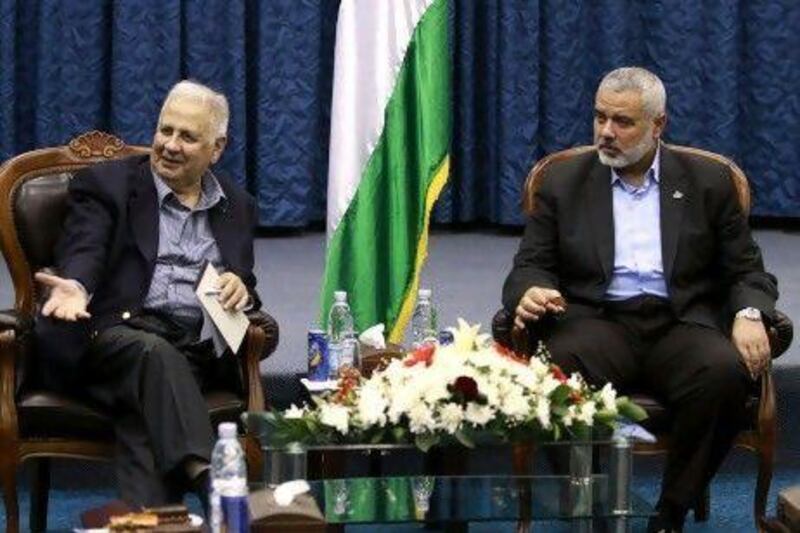JERUSALEM // Hamstrung by bickering and political manoeuvring, the reconciliation pact signed more than a year ago by rival Palestinian factions Hamas and Fatah faced key tests yesterday.
Palestinian Central Elections Commission (Cec) officials were expecting permission to prepare the Gaza Strip for national elections during a meeting with the Hamas premier, Ismail Haniyeh.
Meanwhile, officials from both factions planned to hold discussions in the Egyptian capital over forming an interim government.
Both meetings resulted from a May 20 agreement in Cairo between Hamas-Fatah delegations that outlined a new path towards breaking the reconciliation gridlock. Under the plan, the factions would select an interim authority of politically unaffiliated leaders who would administer both the West Bank, ruled by Fatah, and the Hamas-run Gaza Strip until presidential and parliamentary elections. Those are to be held in six months.
Expectations of progress from the meetings seemed low. The latest accord differs little from the original one, signed in Cairo in May 2011 between Khaled Meshaal, Hamas's leader, and Mahmoud Abbas, Fatah's chairman and Palestinian Authority (PA) president. It failed to gain traction because of political squabbles and opposition from Israel which, along with the United States, considers Hamas a terrorist organisation.
"Confidence is obviously low and we have to wait and see what happens, but you never know," said Hani Masri, a political analyst and head of the Ramallah-based Palestine Media, Research and Studies Centre-Masarat.
He cited the May 20 agreement as an attempt to gain favour of Egyptian leaders, as well as a consequence of financial problems facing Hamas after it dismantled its headquarters in Damascus last year.
Observers said a key indication of the plan's success would be whether Hamas allowed election officials to operate in Gaza.
Cec employees have complained for months that the group has prevented their activities in the Palestinian territory, including updating its voter registry there, last done before it violently wrested control of the territory from Fatah forces in 2007.
Cec officials have estimated as many as 300,000 Gaza voters need to be added to the registry.
Yesterday, Israel denied two Cec delegates, Ahmad Al Khalidi and Shukri Al Nashashibi, entry into Gaza, the unofficial Palestinian news agency Maan reported.
Both the Cairo meeting and Cec efforts in Gaza were originally planned to start on Sunday and it was not clear why they were delayed. Mohammed Shtayeh, a member of Fatah's central committee, expressed hope that the Hamas-Fatah rapprochement would bear fruit.
He cited an increased willingness by Hamas to compromise on arrangements agreed on by Mr Meshaal and Mr Abbas during a February meeting in the Qatari capital.
The so-called Doha agreement came under attack by hardliners in Gaza, who criticised Mr Meshaal for making the decision unilaterally.
The agreement also drew criticism because Mr Abbas would become prime minister of the interim government and still remain president.
But under the May 20 agreement, Mr Shtayeh said Hamas agreed to allow Mr Abbas to wear both hats. "This is essentially just a follow-up of Doha," he said.
Mahmoud Zahar, a founding member of Hamas based in Gaza, confirmed the Islamist group had accepted the arrangement giving Mr Abbas temporary control over the presidency and premiership. He had initially opposed the idea.
"Yes, this was agreed upon - but just for a maximum of six months. If he fails to lead until elections, he should resign," Mr Zahar said.
Analysts said Mr Zahar's change of heart may be linked to the internal party elections Hamas has been holding for the past few months.
Mkhaimar Abusada, a professor of political science at Gaza's Al Azhar University, said it appeared that Mr Meshaal had been re-elected to head Hamas's political bureau for another four-year term despite his announcement in January that he would step down.
He said this strongly indicated the Islamist group had closed ranks behind the Islamist leader and the reform agenda of moderation he has tried to introduce to the group since the beginning of the Arab Spring.
"That has given him a new mandate to go forward with reconciliation efforts," Mr Abusada said.
"That also means that Zahar and the Hamas leadership in Gaza are no longer allowed to criticise Meshaal and his reconciliation efforts."
Follow
The National
on
[ @TheNationalUAE ]
& Hugh Naylor on
[ @HughNaylor ]





